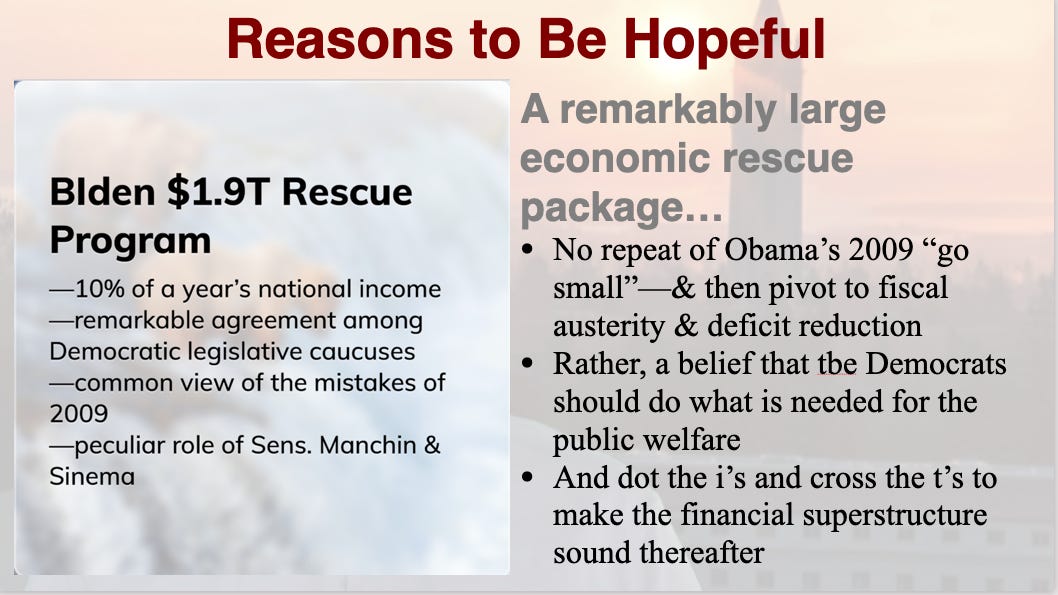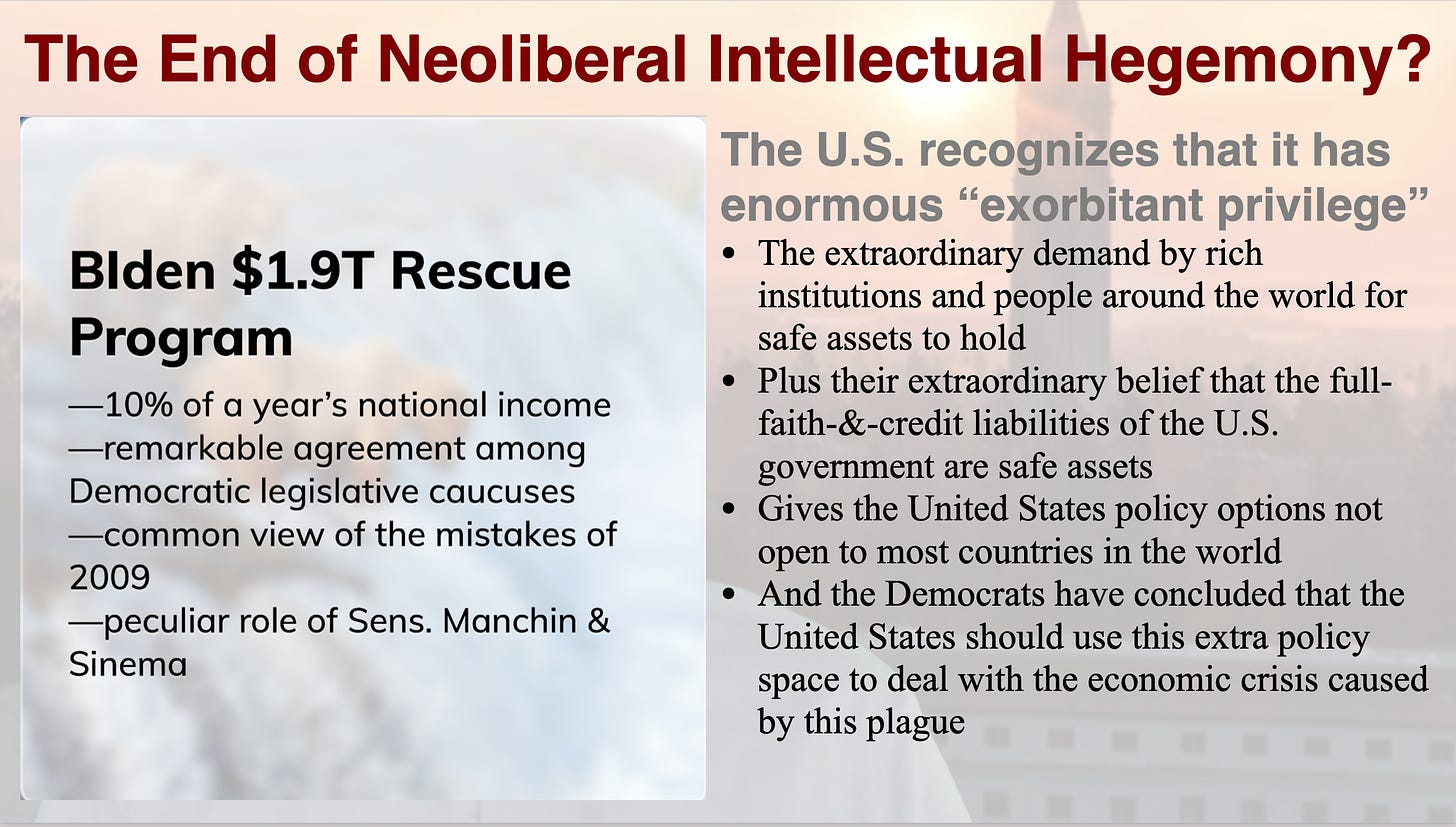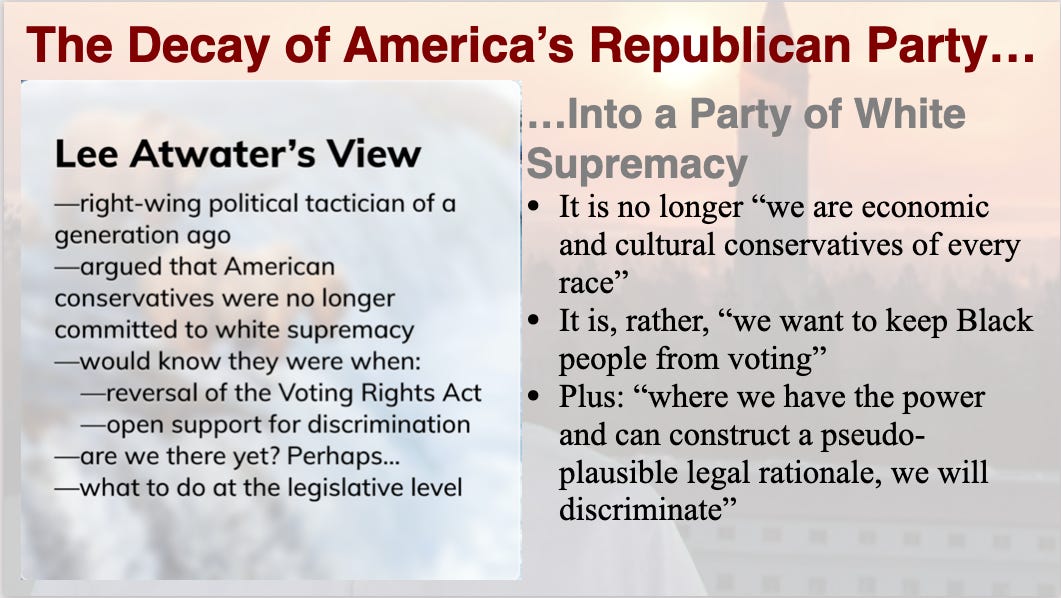SUBSCRIBERS ONLY: DeLongTODAY: Þe Political-Economy State of America Today
Preview of my Leigh Bureau DeLongTODAY briefing for 2021-03-19 Fr
<https://braddelong.substack.com/p/subscribers-only-delongtoday-the>
<https://youtu.be/0JLPxXOT75o>
This is the DeLongTODAY Briefing.
I am Brad DeLong, an economics professor at the University of California at Berkeley, and a sometime Deputy Assistant Secretary of the U.S. Treasury. This is the weekly DeLongToday briefing. Here I hold forth here on the Leigh Bureau’s vimeo platform on my guesses as to what I think you most need to know about what our economy is doing to us right now.
I promised Wes Neff when he agreed to provide the infrastructure for this that I and my briefings would be: lively, interesting, curious, thoughtful, and relatively brief.
Relatively.
I promised I would provide briefings on a mix of: forecasting, politics, macroeconomic analysis, history, and political economy.
Today is a political economy briefing.
Let me try, today, to give an overview of the general situation that America's political economy finds itself in today. And let me take a step back and say the obvious and well-known things—to speak as though I am speaking to a foreign audience that knows little about the United States and its governance, and that needs to be told or reminded what the important things are.
From such a perspective, past three months in the United States have been both horrifying and hopeful.
They have seen the end of a 220-year tradition: that of an unbroken chain in which the transfer of political power from the ruling party to the loyal opposition at the national (although not the state: not in the South) level has been _peaceful_. This tradition was begun in 1800, when president John Adams acceded to Thomas Jefferson’s electoral college victory without choosing violence.
We lost that unbroken chain on January 6th, 2021.
Now there are many who wish to make excuses for Donald Trump.
They say that while some of the mob that overran the U.S. Capitol really did seek to shoot the Speaker of the House and hang the Vice President, they were a small fringe. Most of the demonstrators, they say, simply wanted to assemble peaceably to petition for a redress of grievances.
And, they say, Donald Trump did not really want his thugs to hang the Vice President and shoot the Speaker of the House dead. They thought he did—they were waiting for further instructions once they had overrun the Capitol—and he told them, wink, wink, elliptically, with plausible deniability, that he did. But what he really wanted them to do was to make a ruckus, delay the counting of the electoral votes, remind everybody that he had potentially violent thugs at his disposal, and hope that something would come up.
That is, some of Trump’s defenders say that—others say that it was, rather, a spontaneous popular outburst. And that when Trump said “peacefully” to the demonstators, he meant it, rather than that being an attempt to preserve a shred of pseudo-plausible deniability when his thugs did what they heard him asking them to do after he had said the words that he knew they would take as him asking them to shoot the Speaker of the House dead and hang the Vice President.
We did come remarkably close to watching the Speaker of the House shot dead and the Vice President hanged.
The counting of the electoral votes was delayed.
Speaker Pelosi and Majority Leader McConnell made it a point to finish the counting that day, so that the delay was short. But there was a delay.
Moreover: Trump sent a mob into the Capitol to try to shoot the Speaker of the House dead and hang the Vice President, and only 19 out of 260 Republican members of the House and Senate voted to charge or convict him. Trump famously once said that Republicans would not vote against him even if he shot somebody dead in broad daylight on Fifth Avenue. He greatly understated it. That is horrifying. America’s Republican Party—its office-holders are very sick, and its electoral base is very sick as well.
However, we did get our transfer of power, albeit not peacefully. That is hopeful
Now we have an extra $1.9 trillion program—an extra 10% of a year's national income—the American Rescue Program, devoted to rescue, relief, support and recovery. This is a remarkably large package. It is the result of a remarkable degree of agreement within the Democratic legislative caucuses. In the past, in both 1993 and 2009, senior Democratic legislators have been very, very interested in demonstrating that they are independent actors rather than loyal members of the party. They have been interested in demonstrating that they think for themselves rather than serve the party leader.. They have been interested in using their control of veto points to shape policy to their personal liking. Even more so, I think, they have been interested in demonstrating that they can require policy must be to their liking.
That is much less the case this time.
I think this shift is produced by a common view of the mistakes of 2009, and probably of 1994. The legislators, I think now understand that, if they want to govern in the public interest, they have to demonstrate that the president of their party is a successful manager, and that he has their support, and that he deserves to have their support because his policies are good policies.
Here I must insert an asterisk: Senators Manchin and Sinema appear to still be playing the game by the old rules—demonstrating that they are independent voices, and hence can be trusted to do what their constituents and they believe is in the national interest on each and every issue, no matter how the party tries to corral them. Thus they hope to convince centrists, plus Republicans who are unhappy with the neo-fascist notes currently being sung by the soloists and chorus of the Republican party, to vote for them. But note that even Sinema and Manchin are only taking on this role and pose in a very moderate degree. They cheerfully voted for $1.9 trillion, even if not for changing the rules of the Senate to also include an increase in the minimum wage to $15/hour.
Why $1.9 trillion? Is that the right size? The U S government right now does have exorbitant privilege. Rich people and state actors with large amounts of money all around the globe believe that their assets held in dollars in the United States are safe assets. I do not have time to go into why they believe this. But they do. In this environment the near-consensus among the Democratic policy intellectuals is that it is appropriate to take advantage of this extraordinary demand for U.S. assets. When investor expectations and confidence shift, and when interest rates rise, then will be time to deal with the problems thus created: sufficient unto the day is the evil thereof. We bet that our successors will be intelligent and farsighted enough to deal with the economic problems of tomorrow when they arise. We do not let the fact that we are unsure about how to deal with the economic problems of tomorrow keep us from solving the economic problems of today.
Perhaps this is the end of the neoliberal intellectual hegemony established in the 1970s, when a critical mass of thinkers came to fear that the market had its own logic that could not be resisted but that could only be accommodated. The market giveth; the market takeeth away. And the only possible response, to those who became the neoliberals, was then to say: blessed be the name of the market.
The view today is different. It is: the market was made for man, not man for the market.
One indication of this is that those of us who are still thinking in a more neoliberal the-market-has-its-reasons logic—most prominently now my long-time friend, teacher, and patron Larry Summers and my longtime teacher Olivier Blanchard, both of whom I love dearly—have gotten very little traction in their attempts to issue warnings that perhaps $1.9 trillion is too large, and we should be prepared to recognize that it is—if it turns out to be so—and then rapidly act to reverse course. Those warnings have gotten almost no traction despite all their intellect and influence. That is an interesting signpost to the shifting intellectual climate.
Thus I forecast that the United States is in a position to have a rapid recovery from the coronavirus plague depression. I forecast a high-pressure U.S. economy for at least a while. That will be a marvelous thing. That will be a good thing for Latin America and others who export to the United States. A United States that becomes once again the world’s importer of last resort may become a locomotive for the world, or at least for the Americas.
Now there are deeper issues,
A generation ago there was a very effective right-wing political tactician, Lee Atwater. He used to argue that American conservatives were no longer committed to white supremacy—that their arguments, instead, really were economic arguments about the best economic policy, and bourgeois cultural-order arguments about the best forms of social order. How could you tell that these surface rationales were not masks for positions truly rooted in white supremacy? You knew, Atwater said, because no significant fraction of Republicans was calling for the repeal of the Voting Rights Act and the mass disenfranchisement of African Americans. You knew, Atwater said, because no significant fraction of Republicans were calling for the state to sanction open discrimination.
Well, guess what.
John Roberts and his Supreme Court majority have constructively repealed the Voting Rights Act, and Republicans hope that they can now disenfranchise 20% of African-American voters in states they control. It’s not an attempt to disenfranchise 100%. But 20% is a thing. What do we call this open and notorious embrace of what I think is generally acknowledged to be white supremacy-light?
And state-sponsored discrimination? As I understand it, there has been one trans-female high school athlete in all of South Dakota in the past decade. Yet banning such is the highest priority of one of the Republican Party’s stars, South Dakota Governor Noem. The Republican Party’s position is clear: where we can—wherever we can construct phony religious or phony national-security rationales for discrimination, and wherever the center of the electorate does not have a strong revulsion that would put us in electoral jeopardy—we will discriminate! Is this “we can no longer openly discriminate against African-Americans, yet here is earnest money that we hope to be able to do in the future”?
This white supremacy-light is so very much softer than the white supremacy of even two generations ago, let alone four, or six when the twenty-five million white citizens of the United States held five of the six million African-Americans in the bondage of slavery. That it is so very much softer is a mercy. And for that we give thanks.
Nevertheless, I believe that Lee Atwater’s deathbed hopes that his Republican Party was no longer anchored on white supremacy—that the real message intended for the base was not “Ni—er! Ni—er! Ni—er!”—have been proven wrong.
And once you start shrinking the electorate, you do damage to the prospects for a recovery of democracy that may be permanent.
Which brings us to the issue of countering voter suppression at this moment, when the Democratic Party has control over the all the major political veto points except for the Supreme Court. And this brings us to the so-called “filibuster” in the U.S. Senate.
First, it is called the “filibuster”. A filibuster is an extraordinary, a contrary to normal procedure, a contrary to morality, raw use of power. I think none of the U.S. reporters covering the filibuster in the United States know the origins of the term in things like William Walker's 1856-1857 expedition to make himself President of Nicaragua in the middle of that country's then-civil war—an office from which he was expelled by a coalition of Central American armies in 1857, and then—IIRC—executed by the government of Honduras in 1860. That was the original “filibuster”: to take over a country by force, and loot it.
That procedural requirements for supermajorities in the U.S. Senate for legislation are called the “filibuster” suggests that there is something wrong with them. We have been seeing such procedural requirements erode. It used to be that a state’s senators’ acquiescence, at least, was required for federal judge confirmations. Reconciliation was supposed to be immune from the filibuster because it was an unimportant, technical procedure that needed to be done and that should not be allowed to become a pressure point that groups of senators could use to get their way by threatening obstruction. But Reconciliation has now become the way that business gets done in the Senate: either by or under threat of Reconciliation.
Erosions of the power of the filibuster have, with the exception of BidenRescue now, ObamaCare in 2010, and the very successful Clinton federal financial rebalancing in 1993, been overwhelmingly used to advance Republican policy priorities: tax cuts for the rich and right-wing judges. Voting rights and perhaps minimum wage expansion are equally strong Democratic legislative priorities right now. Perhaps a procedural move to carve out some more exceptions to the general legislation-requires-60-votes will win the acquiescence of Sinema and Manchin. I think the prospects for that are good. But only the senators know what the senators are thinking. It is often to their political advantage to make their thinking opaque. After all, we still do not know whether the Republicans failed to repeal Obamacare during the Trump administration—was it simply because Senator McCain had decided he had had enough, or were there ten senators who did not want it repealed who were happy to let McCain be the hero, but who would have stepped up to fill his role had it been necessary?
This is related to the question of the missing middle in American politics. Structurally, the 20 most centrist senators have the power to drive legislation and governance according to their priorities. And there are stories of how it used to be so back in the 1980s and before—how centrists of that day like Bentsen of Texas and Danforth of Missouri were setters of national agendas whom presidents found themselves lobbying more often than the reverse. But over the past two generations that pattern has disappeared completely.
Republican centrist senators have turned out, since 1992, to have much more allegiance to whatever the current priorities of their party leaders are than to the norms of centrist governance. Now all the Democratic centrists senators—with the partial exceptions of Sinema and Manchin—appear to have reached the same conclusion: that their job is to support their party leaders to the extent they can without risking their reelection, rather than to be a centrist vote block that drives policy to what it wishes.
This is something that I would like some very smart political scientists to explain to me. I am puzzled. And let me close with that puzzlement.
This is the DeLongTODAY Bradcast Briefing. I’m Brad DeLong. Thank you very much for watching.
2565 words









It seems to me inexorable logic that a parliamentary party will defeat a non-parliamentary party in the context of the US system. The US system has too many veto points which a parliamentary party can use. It's HARD to pass legislation in the US and get it to survive court challenges, much harder than it should be. The solution to that problem is to exercise strict party discipline as the means to move policy through the system.
The ante-bellum Democrats knew this. The pre-FDR Republicans knew this. The lesson may have been lost during the Cold War, but the modern Rs re-discovered it and have spent 25 years preventing the Dems from advancing their policies despite consistent electoral success. The only way to defeat this obstruction is for the Dems to adopt the same tactics. We can only hope it's not too late.